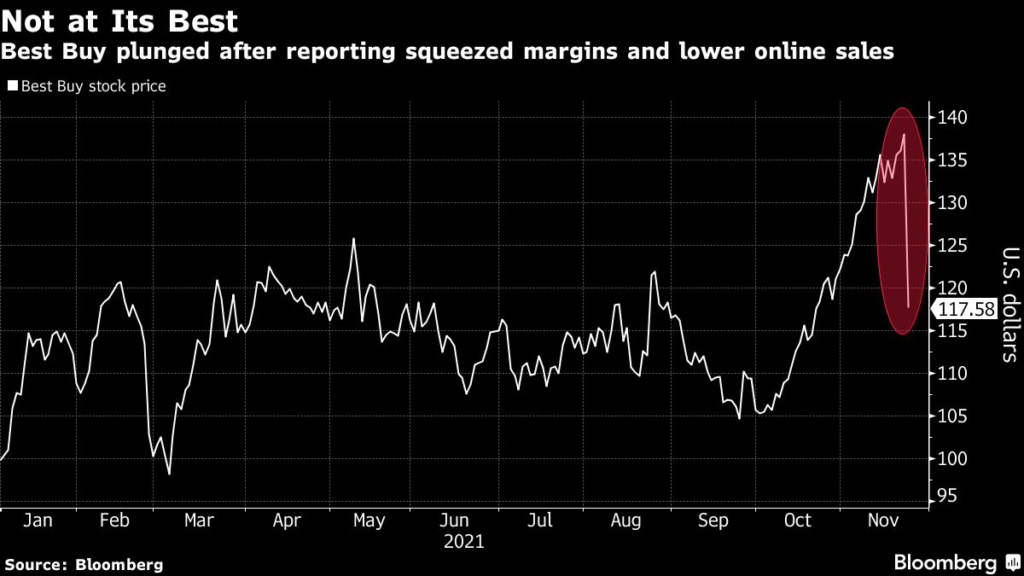(Bloomberg) — Best Buy Co. tumbled the most since the start of the pandemic as increased robberies by organized groups of thieves add to an array of profit pressures while Wall Street frets about the outlook for holiday sales.
Burglaries range from dozens of people rushing into stores and grabbing merchandise to theft by smaller groups, some of them brandishing guns or crowbars, Chief Executive Officer Corie Barry told reporters Tuesday. Northern California has been a particular trouble spot, she said, but Best Buy has seen pockets of criminal activity all over the country.
“We are seeing more and more particularly organized retail crime,” Barry said on an earlier call with analysts. “You can see that pressure in our financials, and more importantly, frankly, you can see that pressure with our associates. It’s traumatizing.”
Best Buy flagged the impact of robberies just as it’s struggling to keep pace with soaring investor expectations, and theft is far from the only financial headache. While Best Buy topped expectations for third-quarter profit and sales, gross margin — a broad measure of profitability — got hit by stepped-up promotional activity and a drag from a new membership program. And slowing sales growth suggests that a pandemic-era boom is waning.
Best Buy shares plunged 15% at 12:21 p.m. in New York after sliding as much as 17% for the biggest intraday decline since March 2020. The shares had advanced 38% this year through Monday, outpacing the 28% gain of an S&P 500 index of consumer discretionary companies.
Opinion: Tae Kim on why the worst is yet to come for Best Buy
The retailer’s credit default swaps widened Tuesday, with the cost to protect the company’s debt against default rising to the highest level since March.
Gross margin edged down 0.1 percentage point to 23.5%, Best Buy said in an earnings statement. That slightly trailed the 23.6% average of analyst estimates compiled by Bloomberg, and the decline in the core U.S. operation was steeper. The company also reported a 10% drop in domestic online revenue as more shoppers returned to stores.
U.S. same-stores sales, meanwhile, climbed only 2% after last year’s torrid 23% expansion. Sales in the fourth quarter, the heart of the crucial holiday season, “are tracking flattish” so far, Wells Fargo & Co. analyst Zachary Fadem said in a note to clients.
The pullback in Best Buy’s shares follows an almost two-month rally that contributed most of the stock’s year-to-date gain. Declines in gross margin at Walmart Inc. and Target Corp. spurred selloffs in each company’s shares last week.
Best Buy’s adjusted earnings rose to $2.08 a share, compared with the $1.96 average of analyst estimates compiled by Bloomberg. Sales climbed to $11.9 billion. Analysts had predicted $11.7 billion.
Industry Complaints
Best Buy isn’t the only retailer contending with theft. Police in Northern California are looking for suspects after a series of robberies in recent days targeted businesses from a Louis Vuitton store to cannabis dispensaries to a Walgreens. A Nordstrom store in Walnut Creek was hit in an organized effort that included dozens of people.
Estimates of the financial impact of retail theft vary. A September report by the Illinois attorney general cited an estimate from the Coalition of Law Enforcement and Retail that organized theft accounts for $45 billion in annual losses. The Retail Industry Leaders Association has said as much as $68.9 billion in products was stolen from retailers in 2019.
Companies besides Best Buy have complained in recent years about the financial blow from crime — and the danger to workers and shoppers.
Home Depot Inc. said two years ago that the nation’s opioid crisis could be contributing to an unexpected surge in thefts from its stores. Lost merchandise had gotten so bad that it would narrow the company’s operating margins, executives said at the time.
Last month, Walgreens Boots Alliance Inc. said it would close five stores in San Francisco because of rampant shoplifting. Theft rates in recent months had risen to five times the company’s national average despite increased investment in security measures, the company said.
Read more: Walgreens closes San Francisco stores due to shoplifting
Organized crime costs retailers an average of $720,000 for every $1 billion in sales, the National Retail Federation found in a survey published late last year.
The trade association, which represents many of the country’s largest stores, echoed Best Buy’s comments about the human impact of the crime. In an August report, the NRF said the repercussions “extend well beyond a company’s bottom line into actual threats against employees and customers.”
(Updates with holiday outlook in first paragraph.)
More stories like this are available on bloomberg.com
©2021 Bloomberg L.P.











